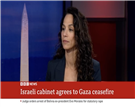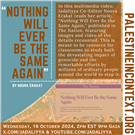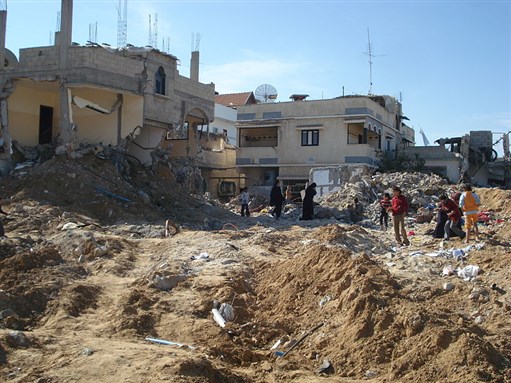The past two weeks have been filled with a flurry of news and developments concerning Palestine that have appeared in piecemeal fashion. As per usual, mainstream international and US media have portrayed events in Jerusalem and Gaza, as well as legislation in the United States, as isolated incidents lacking context. The protagonists in these stories are Israelis with Palestinian shadows. The failure to document the structural violence afflicting Palestinian lives portrays these events as ruptures rather than as inevitable protrusions of a settler-colonial frontier intent on Palestinian containment, displacement, and erasure. In Jerusalem, violent confrontations have justified the further securitization of Palestinians and their access to and sovereign claims over the Haram al-Sharif compound. This has shifted the status quo slightly but indelibly thus expanding Israel’s claims for absolute Jewish sovereignty over a united Jerusalem. In fact, the Israeli Knesset has introduced a bill for its first reading on 26 July 2017 that would subject any alteration to the status of Jerusalem, including naming East Jerusalem as the capital of Palestine, to approval by two-thirds of Knesset members. In the Gaza Strip, the Palestinian internecine conflict together with regional realignments have obfuscated Palestinian claims for freedom and rendered Gaza’s besieged population as political hostages to Israel, Egypt, Hamas, and Fatah. Meanwhile, in the United States lawmakers have adopted AIPAC-inspired legislation that would make participation in the boycott, divestment, and sanction of Israel a criminal felony punishable by fines up to 250,000 US dollars. This round-up attempts to provide some coherence for these events by offering a summary of the news as well as a listing articles written in the past and present that help provide critical context.
Jerusalem
Since 14 July 2017, the world’s gaze turned towards Jerusalem again as news spread that three Palestinians from Umm Il Fahem opened fire on Israeli police officers in the Haram Al Sharif compound. The attack was unique- the assailants are citizens of the State, able to travel without the onerous obstruction of checkpoints, ID cards, and walls, and hailed by Israel as the indistinct Arab and non-Jewish counterparts in the “only democracy in the Middle East.” Additionally, in contrast to other Palestinian attempts to attack Israeli military and law enforcement personnel, evident since October 2015, the young men used home-made guns. The incident made plainly clear the tenuous and active nature of Israel’s settler-colonial frontier well beyond the Green Line’s false partition.
Israel responded by canceling Friday prayers and erecting metal detectors; as if the threat was a matter of security and not the fact that Palestinians remain vividly existent. Palestinian protests have erupted in the form of mass prayer outside the religious compound as well as in demonstrations in the surrounding Jerusalem suburbs that Israel has arbitrarily severed from the metropolis center in its steady attempt to Judaize the city. Since 1967, Israel has expanded Jewish sovereignty over Jerusalem in defiance of its 1949 commitment to maintain the international character of the Holy City; in defiance of a litany of UN Resolutions rebuffing Israel’s colonial ambitions; and in defiance of vapid platitudes to establish East Jerusalem as the capital of the inchoate Palestinian state characteristic of the farcical peace process. Israel has achieved its encroachment under the veneer of security and religious warfare facilitated by an abiding international community that watches how the water rises but does nothing to build a dam. Israel announced that it will remove the metal detectors but this does not equate to Palestinian freedom to worship let alone their freedom of mobility.
For a brief history of Jerusalem and its steady ethnic cleansing from 1948-present, you can read my essay, “Structural Violence on Trial and the Movement to Resist Erasure.” Here is a brief excerpt:
Since its inception, Israel has considered the Palestinian population in areas adjacent to Jerusalem as an obstruction to the territorial contiguity between the Jewish populations in Jerusalem and those in the coastal areas. Within months of the collapse of the UN Partition Plan, the western areas of Jerusalem were transformed from a place with a mixed population to one where Jewish predominance was absolute. To achieve this dramatic transformation, Zionist armies evicted nearly 80,000 Palestinians from West Jerusalem, reducing their original size by half.
In the immediate aftermath of the 1967 war and the occupation that followed, Israel issued the Municipalities Ordinance (Amendment No. 6) Law that effectively annexed approximately 70 square kilometers of the West Bank and integrated it into the Israeli municipality of Jerusalem. Israel sought to incorporate the maximum amount of Palestinian land with the least number of Palestinians. The state thus bestowed East Jerusalemite Palestinians the legal status of foreign permanent residents rather than citizens, with the aim of undermining their ability to remain in the area.
Permanent residency, indicated by blue identity cards, is a special category of permit-holders that affords residents the right to vote in municipal elections, but not in national elections, and whose residency is in a permanent state of temporariness. By legislative means, Israel made Palestinian residency in Jerusalem a privilege rather than a right and transformed their status from an indigenous population to a foreign one. Palestinian Jerusalemites have thus been at extreme risk of arbitrary removal.
In this 2010 essay, Jonathan Cook describes Israel’s attempts to encroach upon the Haram Al Sharif compound in particular. Cook illustrates how metal detectors and the securitization of Palestinians have been part of an incremental plan to limit Palestinian access and sovereignty and that the most extremist elements of Israeli society would like to blow up the Al Aqsa mosque and use archaeology as part of its justification. Cook describes the ethnic cleansing of the Mughrabi, or Moroccan, Quarter, in 1967 as a prescient and alarming episode. He writes,
…in the immediate wake of the “miraculous” victory in 1967, the Israeli government saw the chance to create a wide prayer plaza in front of the Wall, making it the symbolic heart of an expanded Jewish state that could unite religious and secular Jews.
All that stood in their way were the quarter’s 135 homes.
On the night of 10 June, Uzi Narkiss, head of the army’s central command, authorized 15 private demolition crews to raze the quarter under cover of dark. He, like the politicians, knew that neither the international community nor the Israeli courts would consent to such a brazen violation of international law.
When Teddy Kollek, the mayor of West Jerusalem, had consulted the justice minister, he had been told: “I don’t know what the legal status is. Do it quickly and may the God of Israel be with you.”
Nur Arafeh writing for Al Shabaka describes how religious war and conflict have historically been used to obscure Israel’s colonial ambitions. She also describes how the Peace Process has subsumed the Palestinian Authority and incapacitated its means of resistance to Israel’s expansion. She writes,
Between 1967 and 2013, Israel revoked the ID cards of more than 14,309 Palestinian residents. According to the 2003 Temporary Amendment to the Citizenship and Entry into Israel Law (amended in 2005 and 2007), West Bank Palestinians married to Jerusalem residents do not qualify for residency status and are only granted temporary permits in exceptional circumstances. In contrast, Jews who immigrate to live in Jerusalem are granted immediate citizenship, reflecting the apartheid nature of the Israeli regime.
While strengthening the Jewish presence in Jerusalem, Israel has sought to contain the urban and demographic expansion of Palestinians via discriminatory urban and zoning policies consistent with ethnic cleansing. More than one third of land in Palestinian neighborhoods has been classified as “open landscape areas” where building is prohibited, constricting Palestinian building to only 14% of the land of East Jerusalem and causing an acute housing crisis. Moreover, since 1967, Israel has destroyed 1,673 housing units, affecting around 8,000 people between 1967 and 2013. With the implementation of all these policies, Israel is aiming to achieve a ratio of 30% “Arabs” and 70% Jews within the Jerusalem municipality.
Discriminatory Israeli policies are also apparent in the discrepancies in service provision between Palestinian and Jewish neighborhoods. Less than 10% of the municipal budget is allocated to Palestinian districts despite Palestinians paying the same amount of arnona (property) tax as Jewish citizens.
In a more recent essay on the conditions in Jerusalem, Diana Buttu states clearly why metal detectors in Jerusalem are not a security measure at all,
In the name of "security," Israel expropriates Palestinian land. In the name of "security", Israel builds Israeli-only settlements on stolen Palestinian land. In the name of "security" Israel demolishes Palestinian homes and schools and in the name of "security" Palestinians are besieged in Gaza, forced to live without electricity, adequate medical supplies or water and even barred from accessing the sea.
And, when Palestinians are gunned down by mass murderers, as they were in the 1990s in Hebron by Baruch Goldstein, in the name of "security", Palestinians - and not Israelis - are subject to increased security restrictions. In short, Israel seeks to turn Jerusalem into Hebron: blocked off from Palestinians, with convenience for Israeli Jews taking precedence over Palestinian rights. So as Israel continues to gun down Palestinians, who will provide security to Palestinians?
Since 14 July 2017, Israel has killed four Palestinians and injured over 500 - this has not attracted international attention any more than the condition of structural violence wrought by apartheid and settler-colonialism has. Worse, Palestinians have literally had to smuggle corpses out of morgues to prevent them from being confiscated by Israel for use as political barter. Israel’s apartheid regime dehumanizes Palestinians and diminishes the value of their lives in both life and death.
Gaza
The humanitarian situation in Gaza continues to dominate headlines as if it were the result of a natural disaster and not the outcome of political collusion. Last week marked the third year since Israel’s most devastating military offensive against the coastal enclave. In the span of 51 days in the summer 2014, Israel killed nearly 2,200 Palestinians including 534 children. Though unprecedented in degree, the 2014 offensive was Israel’s third onslaught in six and a half years; the fourteenth since unilateral withdrawal in 2005; and the twenty-second since announcing withdrawal in April 2004.
Counterinsurgency warfare together with a comprehensive land blockade and naval siege has become the norm, rather than the exception, of Israeli policy towards Gaza’s 2.1 million Palestinians. There is nothing normal about Israeli policy, which ensures that Palestinians can survive but not thrive. Moreover, even under its meticulous calculations, including a 2000 calorie/day diet, survival is coming under risk as the UN reports that the Gaza Strip will be unlivable by 2020.
Rather than challenge these conditions, the international community is normalizing them. As a partner in the Gaza Reconstruction Mechanism (GRM) the United Nations has not only accepted Israel’s imposition of conditions on goods that can enter the coastal enclave, it has also absolved Israel of responsibility for the devastation caused by war and siege. By maintaining the closure of the Rafah border crossing, Egypt is colluding in the land blockade and by recently cutting aid for electricity to the Gaza Strip, Fatah has become a part of the blockade regime. In addition to cutting electricity, Fatah has also slashed salaries to its public servants resident in the Gaza Strip and reduced travel permits for patients in need of medial treatment prohibiting them from leaving the territory.
Recent regional shifts resulting in the Gulf Cooperation Council boycott of Qatar have exacerbated these conditions as they have resulted in further economic sanctions upon the Gaza Strip. Although Hamas is the purported target of these policies, they are not the primary victim. To the contrary, Hamas is reorienting itself in the region as it is establishing a rapprochement with former Fatah rival, Mohammed Dahlan. In 2007, Dahlan led a U.S.-backed failed coup against Hamas in the Gaza Strip and has since become a rival of Mahmoud Abbas as well. Hamas’s political calculations would further entrench the political divisions between Gaza and the West Bank in exchange for Egypt’s easement of the blockade through the Rafah border.
The Popular Front for the Liberation of Palestine has condemned both Hamas and Fatah for using Gaza’s besieged Palestinian population as political hostages.
Ramzy Baroud describes Dahlan’s likely return to the Gaza Strip as Israel’s final bid to squash Palestinian resistance therein. He writes,
Trump`s ascendency, however, has mixed the cards like never before. Washington, which has governed the Middle East through clearly defined doctrines, seems to have no doctrine, but impulsive decisions made by a Twitter-obsessed president.
The American retreat offered the kind of political space needed to be filled by those vying to control the region in the future. With Israel remaining on top of the pyramid, an alliance involving Egypt, the United Arab Emirates and Saudi Arabia began moving into a clear formation to achieve dominance, through destroying some foes, isolating others and out-manoeuvering the rest.
According to this new "vision", Hamas, which could not be defeated by sheer force, could be relegated into an ineffectual political force through an alliance with Mohammed Dahlan.
The "Dahlan plan" then emerged. A leaked document, widely reported in Israeli and other media, purported to show that Dahlan and Hamas have been negotiating the return of the former to Gaza, to head a government there in exchange for an Egyptian easing of the siege.
According to the plan, Hamas will remain in control of the interior ministry and will not disarm, but, as worded by Haaretz`s Zvi Bar`el, Israel, at least, "would have a partner in Gaza who supports reconciliation.`
Overwhelmed by the unexpected move, Abbas is now trying to make life even more difficult for Palestinians in the Strip, hoping to exert more pressure on Hamas to end its possible partnership with Dahlan.
Anti-BDS Legislation in the United States
As the Gaza Strip teeters on the edges of an unprecedented humanitarian crisis and as Israel embarks on indelibly transforming the status quo in Jerusalem, lawmakers in the United States are contemplating making non-violent protest of Israel a felony.
According to Glenn Greenwald and Ryan Grim writing for The Intercept explain,
…a group of 43 senators — 29 Republicans and 14 Democrats — wants to implement a law that would make it a felony for Americans to support the international boycott against Israel, which was launched in protest of that country’s decades-old occupation of Palestine. The two primary sponsors of the bill are Democrat Ben Cardin of Maryland and Republican Rob Portman of Ohio. Perhaps the most shocking aspect is the punishment: Anyone guilty of violating the prohibitions will face a minimum civil penalty of $250,000 and a maximum criminal penalty of $1 million and 20 years in prison.
Dena Takruri of AJ+ provides a three-minute summary of The Intercept’s investigatory report.
Several months ago, Josh Ruebner wrote about the controversial bill for The Electronic Intifada. Ruebner describes how the proposed legislation broadly refers to the boycott of settlement products as well by describing those industries as being in “Israeli-controlled territories.” He writes,
The bill seeks to amend two laws – the Export Administration Act of 1979 and the Export-Import Bank Act of 1945 – to accomplish its aim.
The Export Administration Act is the primary law which makes it illegal for US corporations to comply with the Arab League boycott of Israel. The Department of Commerce maintains an Office of Anti-Boycott Compliance to ensure US corporations do not participate in the Arab League boycott and to fine those that do.
The Israel Anti-Boycott Act would amend this law to encompass “restrictive trade practices or boycotts fostered or imposed by any international governmental organization against Israel or requests to impose restrictive trade practices or boycotts by any international governmental organization against Israel.”
Even if a corporation was not responding directly to a call from an international governmental organization to boycott Israel or even settlement products, it could still run afoul of this bill if its actions are perceived to “have the effect of furthering or supporting” this boycott.
The legislation is a stated policy goal of AIPAC’s 2017 agenda. That helps to explain the lack of scrutiny involved in reviewing the bill despites its flagrant infringement on First Amendment rights. In response to media coverage and pressure by the ACLU, Congressional sponsors of the bill have vowed to amend the legislation. While the amendment will likely remove the criminal penalties associated with boycott, it will maintain the provisions applying prohibitive civil penalties. Ryan Grim explains,
[Senator Bill Cardin] and the ACLU, he said, disagreed about what the bill would do. “I respect greatly the ACLU. I think that many of their points are just not correct. We don’t want to do anything to infringe freedom of speech,” he said.
…
On Monday night, in an op-ed in the Washington Post, two top officials at the ACLU stood by their legal interpretation. “Violations would be punishable by civil and criminal penalties of up to $1 million and 20 years in prison,” write David Cole and Faiz Shakir, the ACLU’s legal and political directors, respectively.
“We thought we only dealt with civil penalties, not criminal penalties,” Cardin told The Intercept. “But if that’s not clear, we’re willing to deal with these issues.”
If the bill were amended to clarify that no criminal penalties could be applied, violators would still face a $250,000 civil fine or more.


















